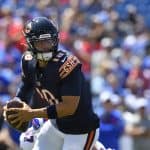Sports betting trends are everywhere. You’ll see people touting records like “Team X is 12-3 against the spread in its last 15 home games” or “The under is 9-2 when Team Y plays on a Thursday night.” These stats sound convincing, but do they actually help you make better bets? The reality is that most betting trends lack predictive power; sportsbooks set lines based on market efficiency, not past trends. Sharp bettors focus on pricing inefficiencies rather than blindly following historical trends. So how can you distinguish meaningful betting trends from noise? Let’s break it down.
Sports Betting Trends and How to Analyze Them

Expand your bankroll and boost long-term profitability with Portfolio EV. Discover more +EV bets with a FREE TRIAL — visit our Portfolio Betting page today!
Correlation Doesn’t Equal Causation
Just because a team has performed a certain way in past games doesn’t mean it will continue that pattern. Many trends exist purely due to randomness.
For example, let’s say an NFL team has covered the spread in eight straight Monday Night Football games. This may seem like a strong trend, but does playing on Monday actually impact its performance? Probably not. The team’s ability to cover is influenced by factors like injuries, matchups and line movement — not the day of the week.
Trends Are Priced into the Market
Sportsbooks are not in the business of giving away free money. If a trend becomes widely known, oddsmakers adjust the lines accordingly. Betting markets are shaped by professional bettors, and if a certain trend provided an edge, sharps would exploit it until the market corrects itself.
If a trend shows that NBA road underdogs cover the spread at a high rate, sportsbooks will adjust the lines, making those bets less valuable over time.
Small Sample Sizes Create False Signals
Many betting trends rely on arbitrary cutoffs like “last 10 games” or “since 2020.” This is problematic because small sample sizes lead to misleading conclusions. A team might be 7-1 against the spread in its last eight home games, but what if those wins came against weak opponents and the one loss was to an elite team? Looking at long-term data and adjusting for opponent strength gives a more accurate picture.
Public Betting Trends Are Often Contrarian Traps
Another common mistake is blindly following public betting trends, such as “80% of bets are on Team X, so fade that team.” While fading the public can work in some cases, professional bettors don’t just bet against the public — they bet against bad lines.
Betting percentages alone don’t tell you whether a bet has value. Instead, look at line movement and sharp money indicators to determine if a side is truly profitable.
How to Analyze Sports Betting Trends Correctly
Now that we’ve covered why most sports betting trends are unreliable, let’s discuss how to find meaningful betting trends that actually have predictive value.
Look for Trends Backed by Data and Logic
A useful trend should have a logical explanation behind it. Instead of arbitrary against-the-spread records, focus on matchup-specific angles and market inefficiencies.
For example, some NFL teams perform better in extreme weather conditions (like cold or high-altitude games) because they are built to thrive in those environments. This is a trend backed by logic, not just historical results.
Adjust for Market Context
If a trend has been profitable over time, check if sportsbooks have adjusted their lines accordingly. If they have, the edge may be gone. Look for trends that aren’t widely discussed or exploited by the betting market.
Combine Trends with Other Sharp Betting Strategies
Trends should never be the sole reason for a bet. Instead, use them alongside key strategies like:
- Market-Maker Sportsbooks – Compare lines across sharp and recreational sportsbooks to find inefficiencies.
- Closing Line Value (CLV) – If a trend-based bet consistently beats the closing line, it may hold value.
- Portfolio EV – Shop lines, find +EV bets and bet in higher volume to give yourself the best chance of long-term profitability.
Conclusion: Betting Smarter, Not Harder
Sports betting trends can be useful, but only when they are backed by data, logic and market context. Blindly following historical records like “Team X is 10-2 against the spread on the road” will not make you a profitable bettor. Instead, focus on finding meaningful betting trends that align with real betting edges. Want to gain a true edge? Analyze trends with Portfolio EV, focus on market inefficiencies and always ask yourself: Is this trend actually predictive, or just random noise?





























